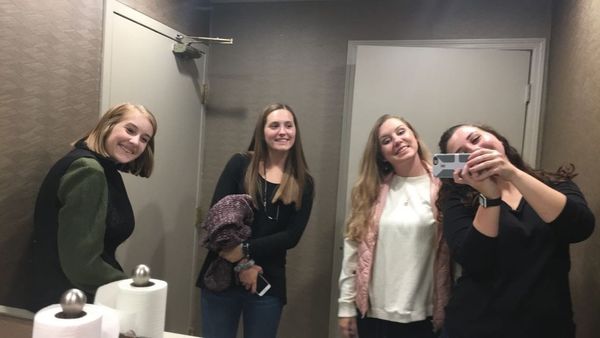Interacting with people is a part of every day life. We can't make it through a day without making some sort of social interaction with words, body language, touch, etc. Humans are social creatures. We crave interaction, we desire the best for ourselves, we want to be noticed--admired. Deep down, we all want these same things.
But if we don't understand the best way to communicate and interact well with one another, how will we be able to best achieve our goals and ambitions? We are innately social, but how we interact socially can make or break us...or another person.
So what do we do when we begin to realize that our interactions aren't improving or benefiting us? When we cannot persuade, encourage, or be admired in our day to day lives? How do we make our voice more heard and respected?
People skills are an incredibly necessary and vital part of our lives, especially when it comes to getting what we want. After all, we all go into conversations and interactions expecting to gain a benefit from them. We are all driven by our selfish desires, whether we realize it or not, so why not learn to control these skills and use them even more to our advantage?
There are a good handful of books out there that will really help you hone in on people skills--skills you may already be doing without realizing it--and help you better control and think about them in order to help lead you to eventual success. The books go much further in detail on a variety of skills and ways to use them than this article does, but below are a list of key components that anyone and everyone can start using, bit by bit.
If you need more confidence, if you're looking for more recognition, admiration, or power in a situation, or if you just want to elevate your self-image or simply want to do better in effectively and efficiently interacting with others day to day, here are some key ways to improve your people skills:
Smile.
It may seem redundant, because obviously smiling is super friendly and welcoming in social situations, but the problem is, so few people actually do smile when they're talking or listening to someone else. Think about a time when a simple smile from someone you knew or from a stranger lit up your day, maybe even put a smile on your own face. You felt accepted, noticed, appreciated by that simple smile, and because it elevated your mood, you were more willing to talk, laugh, or be productive about something. Smiling when talking to someone or out in social settings makes you and the other person feel confident, it boosts both of your moods, and more than likely you guys will continue to interact more in a positive way. Next time you're talking to someone, force yourself a smile into the conversation, and watch the magic begin.
Make eye contact.
Eye contact is incredibly important in conversation and interaction. It shows you're focused, interested, and intent on the conversation with the person. Sometimes, it may be intimidating to do, but it can make both of you feel important and more confident. And they will probably reciprocate the eye contact, and you'll be taken more seriously. (Plus, you can learn a lot more about a person when you look into their eyes; cliche, but true.) The eyes are the window to the soul, as they say.
Remember names, and use them frequently.
Hearing our name is like music to our ears. Humans are selfish, so what better way to elate this than by someone calling us by our name (in a positively unexpected way, too?). What's even better is first meeting a person and they remember your name right off the bat, or the next time you see them, they address you first by your name. And if you don't remember their name, you feel bad about it and maybe finally try to make the effort to remember their name for future meetings. Even if you aren't good with names, you can still learn them quickly and use them confidently. Maybe keep a journal of names on you, repeat it several times to yourself, connect the name and person to something, etc. But if you can remember and use a person's name in conversation, you not only catch their attention, but you boost their (and maybe your) confidence, and you can start being taken more seriously.
Compliment, and mean it.
Compliments are like candy. We eat up them up, we love them, we crave them. So why not compliment others who desire them? After all, the best compliments are the sincere, unexpected ones. People can tell when a compliment is forced and isn't meant--or when one is using flattery, especially excessively--and they'll shut down and stop listening, talking, or overall interacting as enthusiastically. So next time you're in a social setting, compliment someone sincerely and be genuinely interested in what you are complimenting them about. It not only grabs their attention and makes them appreciative, it also helps to lighten the mood and make conversation go easier from there.
Listen intently.
Listening is a big problem for many people. We always want to interject, to speak our minds, to hear ourselves talk about what we want to talk about. Many people even spend half a conservation gazing off in the distance, replying a simple "Mhmm" or "Yeah" or "Okay" in response to gaps in the other person talking, to give the impression we are listening. Of course, we've all felt the adverse effects of this tactic, which is why, to better improve people skills, we have to be a listener. Listening in a conversation is as important, if not many times more important, than speaking. It shows the person that we care, we are interested, that we are paying attention and actually want to be a part of the interaction. If we spend half a conversation waiting on our turn to speak and say what we want, rather than listening, it becomes obvious to the other person. It makes the interaction less sincere and effective, and may make them avoid you in future confrontations if you just talk, talk, talk, and talk about what you want, especially. Next time, be sure to listen, reply with questions to what they're saying, and show your genuine interest in the person's words; it'll open a smoother doorway for the conversation and future ones (plus, it just makes you more mature and professional when you pay attention to what the other person says).
Ask questions.
And when you ask the questions, try to make sure that they are well thought out, related to the conversation, and that you are interested genuinely in the question you are asking. Asking questions fulfills the subconscious selfish desires of the other person to want to talk about themselves, and it also shows you are being respectful and sincere when you ask important questions. It shows you're listening and makes you appear more mature. It can also lead to smoother conversation thereafter, and as you get to know the person, you get to understand them more and gain more of a trust between you two. We want to talk about ourselves and what interests us, so it's very respectable when someone asks sincere, thought-out questions about such things.
Focus less on "I" and more on "You."
Since we all are innately selfish, we have a desire to want to talk about me me me. And since other people are innately selfish, they don't want to hear you talk only about yourself because they want to talk about themselves, too. To be a great conversationalist, you have to forcibly push aside the desire to talk only about yourself, and you have to start focusing on the other person. You'll seem more interesting because you are (hopefully) interested in them and what they have to say. Going back to asking questions, this just shows further interest and allows them to keep speaking and soak up their selfish desires. In fact, don't be dismayed that having good people skills means talking less about yourself to inflate your ego and more about listening and talking about the other person, because you may actually learn something you didn't expect by focusing more on them.
Watch your body language.
It's one of those, you say "yes" when shaking your head "no" kind of thing. If your body language shows anything other than what you are trying to say, this can lead to problems in the conversation. If it also over accentuates what you're saying or feeling, this can also cause problems. Becoming more aware of your body language when speaking or listening can save a lot of confusion and can even steer the conversation how you'd like. Don't cross your arms, don't tap your foot or fingers for a conversation to end, don't gaze into the distance. You want to seem interested, you want to seem professional, and shutting yourself off and being rude with your body language is not a people skill--it's a people deterrent. Nod your head while they speak, shake hands, smile, point your feet and body directly towards them, talk with hands or keep them to your side. Body language many times says more than what your words do.
Don't argue or be aggressive.
Big rule of thumb: don't be aggressive. This means do not be aggressive in your tone, choice of words, body language and actions, etc. No one wants to converse with someone who's just going to be rude or mean the whole time. When someone raises their voice, we raise ours, and then it just becomes loud bickering and subconsciously our body raises Adrenalin in us as our voice gets louder, whether we want it to or not or whether we're angry or not, and this can lead to rash, not thought out decisions. Aggressive comments or actions can quickly turn any interaction sour. So if you do start to get heated in a conversation, take a deep breath and a step back (maybe even literally) and think about what you'll say or do physically next that could set the interaction in a more negative or positive reaction. Think about how they would respond, and question if it's worth it to be aggressive or not, because more than likely, it's not.
Leave on a good note.
This is incredibly important. I mean, all of this is incredibly important, but just like first impressions matter, so do end notes to that first interaction (or any). If you use pretty much every one of these skills as you end an interaction (ex. smile, be complimentary and appreciative, use their name, wave, be cheery, look them in the eyes as you say goodbye, etc etc etc), then that'll be the last and freshest thing they remember of you. So, leaving on a good note keeps them happy, keeps them thinking about you, and makes them want to interact again with you because, whether it started badly or not, leaving on a good note shows thoughtfulness and maturity--especially if the interaction initially didn't start off well. And if it did start and go well, leaving on a good note gives an even greater impression of you.
If you're interested in looking further into these simple people skills, here's a couple of books that these key points were drawn from that you can check out to continue to improve your people's skills!
How To Win Friends and Influence People
How To Have Confidence and Power In Dealing With People
Don't be limited to just these few books or the tips in this article! There are many out there that go over similar principles in different ways, but these are just three good starters.
Now get out there, be confident, and go and get 'em.



















